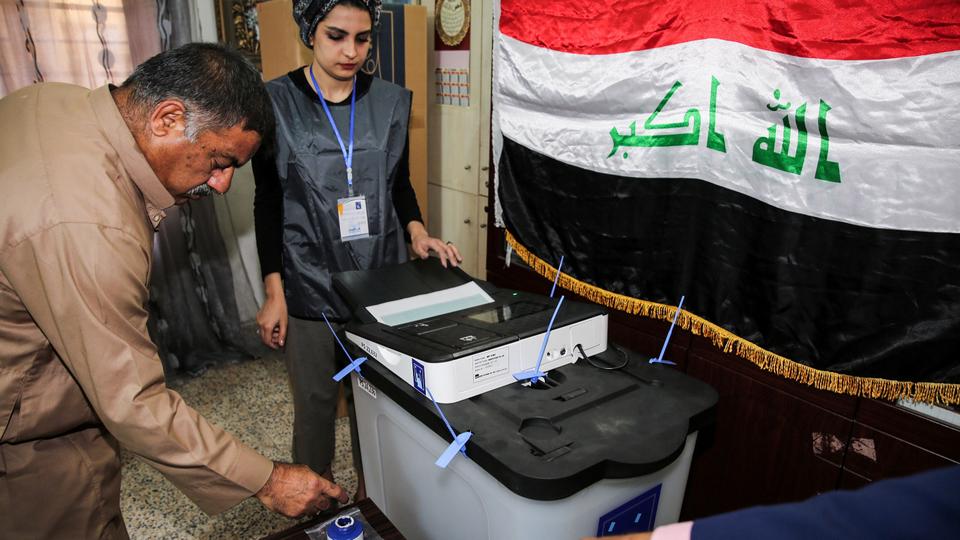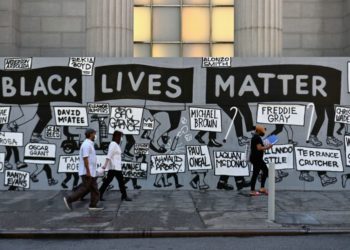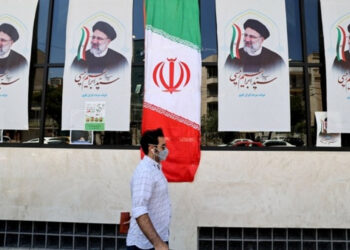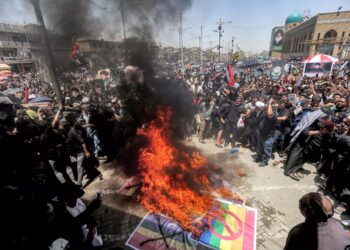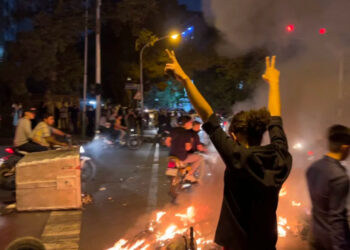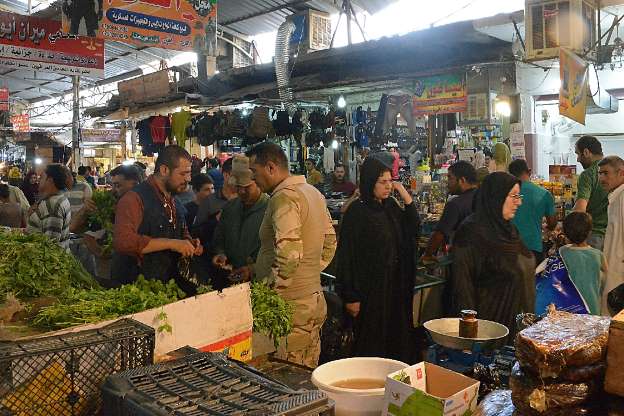The recent parliamentary election in Iraq has almost resulted in a shock for Iraq’s Kurdistan Region and Kirkuk. Opposition political parties that participated in the election have never thought they would see such a fraud that melted their votes with the help of electronic ballot boxes.
Claiming that notorious fraud was perpetrated during the election, the opposition has presented enough evidence, even though they may have exaggerated to some extent. Considerably, they have claimed that the number of votes in their favor had been reduced terribly through the electronic ballot boxes.
Even if they don’t state it formally, all the political parties that reject the election results are convinced that Iran and Iranian Quds Force Commander Qasem Soleimani are behind the notorious electoral fraud conducted to benefit the Patriotic Union of Kurdistan (PUK) and Kurdistan Democratic Party (KDP).
A few days after the election, one of the parties that rejected the election outcome sent delegates to Iran’s Consulate in Iraq to inform the Iranians about the electoral fraud, but the only reply the delegates got was: “Your message has been received.”
Iranian Influence
On January 13, 2014, Soleimani invited three PUK leaders – Hero Ibrahim Ahmed, wife of former President Jalal Talabani, PUK’s first deputy secretary Kosrat Rasul Ali, and second deputy secretary Barham Ahmed Salih – to Tehran and asked them to settle PUK problems related to the government formation. “PUK is mine before yours,” Soleimani reportedly told the PUK leaders in that meeting.
In late 2017, Salih registered a new political party under the name of the Coalition for Justice and Democracy. He later declared a new list for the May 12 parliamentary election.
By doing so, Salih delivered a message to the Iranians that he didn’t care about weakening PUK, a step that is seen contradictory to the will of the Iranian forces in the Kurdistan Region. In addition, Salih was able to create a relationship with the Iranians via officials who were close to the government.
Before the May 12 election, the Iranians promised Salih that they would stay neutral and wouldn’t interfere in the election in the Kurdistan Region. The same message was sent to the Gorran (Change) Movement, an Iraqi Kurdish political party. However, in the last hours of the election, when the initial results were published, it became clear that Iran had changed the results in favor of PUK and KDP.
Iranians firstly targeted the coalition of Salih and the Gorran Movement. The problem stemmed from the fact that the Iranian group Salih’s coalition and the Gorran Movement agreed with, was from the “other side” of the government – those institutions in Iran closely loyal to Ettelaat (The Ministry of Intelligence of the Islamic Republic of Iran), not the Islamic Revolutionary Guard Corps (IRGC) of Iran and the so-called Pasdaran.
Who is Qasem Soleimani?
Qasem Soleimani is a senior Iranian military officer in the Islamic Revolutionary Guard Corps (IRGC). In 1998, he became commander of IRGC’s Quds Force, a division primarily responsible for extraterritorial military and clandestine operations.
Soleimani was born in Qanat-e Malek, a village in the Kerman Province in southeastern Iran. His methods have been a mixture of tough and shrewd strategic diplomacy and military assistance to ideological allies. Soleimani had given military assistance to anti-Saddam Hussein Shia and Kurdish groups in Iraq for a long time.
Now, he has a decisive impact on the theatre of operations in the Kurdistan Region, especially in the Sulaimanya province. It would be no exaggeration to call him the governor of Sulaimanyah or to name the city “City of Soleimani.”
Iran’s Demands
PUK’s second deputy secretary Salih knows very well that the Iranians are seeking revenge upon him for two reasons: firstly, because he has weakened PUK by forming a new political party; and secondly, because he refused to declare a national salvation government in the Sulaimanyah province after the October 16 attacks on Kirkuk that separated the city from the so-called KDP zone (Duhok and Erbil).
The Iranians want the Gorran Movement to implement a similar policy. They invited them to a hotel in Sulaimanyah to deliver the message declaring a salvation government in Kirkuk and the Sulaimanyah province to separate them from the KDP zone.
Responding, the Gorran Movement representatives reportedly asked the Iranian generals: “Is this the story of Safwan Canvas army tent in which Iraq accepted all demands of America?” They asked whether Iran wanted them to accept all its demands right there in the hotel, and refused to succumb to the pressure.
Iran intended to present the same set of demands to the Kurdistan Islamic Union (KIU), an Islamic moderate reformative political party in the Kurdistan Region, as well. They asked to meet the Secretary-General of the group, Salahaddin Bahaaddin, but he refused.
The second issue between Iran and KIU resurfaced when they stood against passing of a contested law on the Popular Mobilization Forces in Iraq, a mostly Iranian-backed coalition of Shi’ite militias, which transformed them into a legal and separate military corps.
Role of the United States
As part of its foreign policy, Iran rarely goes against the will of its friends and backs them in difficult times. Moreover, Iranians purposefully want to show that their “meat is their enemies poison” by taking revenge right away when someone goes against them.
I do believe that this view is the opposite of the American approach, as the U.S. neither wants to keep its friends nor punishes those who play along the Iranian line in Iraq. Strangely, the Americans pick friends and enemies on the temporary basis.
Unfortunately, the United States failed to play their role as well as the Iraqis wanted them to. Washington is a total clock-watcher rather than a true player on the political stage of Iraq: it doesn’t take action.
They have not been able to defend Salih, their closest friend in the Kurdistan Region. Even after the May 12 election resulted in a big fraud, U.S. Special Presidential Envoy for the Global Coalition to Counter ISIL Brett McGurk advised Salih to accept the results of the election and participate in the political process in Iraq.
Additionally, McGurk frankly informed Salih that success of the political process in Iraq is more important for the U.S. than their friends’ critical remarks on the election.
The passive attitude of the United States toward the big fraud the opposition in Iraq is campaigning against deteriorates the situation in the country and surrenders the Kurdistan Region to Iran.
If the results of the last Iraqi election are accepted – something the Iranians want and have worked for – no political party will ever feel encouraged to participate in the next elections until they get the green light by Iran.
The Kurdistan Democratic Party (KDP) that has mostly sided with the so-called U.S.-Saudi Arabia-Turkey line in Iraq has recently switched its affiliation to the Iran-Russia line. It is now considered as one of the Iranian political allies in Iraq. They have also signed the biggest gas business development agreement with Russian oil company Rosneft.
The relationship between Iran and the KDP has developed in a way that helped to hold a meeting between Qasem Soleimani and Masoud Barzani, head of the KDP and the former President of the Kurdistan Region, last week to discuss the latest developments in the country.
The main question, however, still remains: why has the United States left an oil-rich and economically important area, the Kurdistan Region, to Iran? After all the sacrifice and billions in investment, does the United States really want Iraq to be the winning field for Qasem Soleimani and the Iranians, while Washington remains just a silent clock-watcher itself?
Disclaimer: The views and opinions expressed here are those of the author and do not necessarily reflect the editorial position of The Globe Post.

